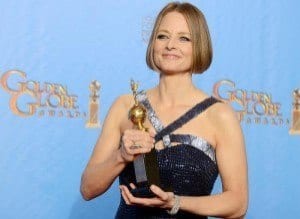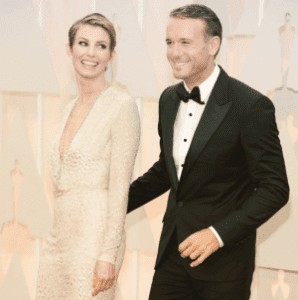
Foster’s Emotionally Charged Golden Globe Acceptance Speech Raises Questions about the Politics of “Coming Out”
Jodie Foster took the very publicly documented chance yesterday at the Golden Globe Awards to staggeringly announce a fact that most of her audience was already unofficially aware of—she is gay. Jodie’s admission was candid, honest and heartfelt and treated the fact itself as a byline to celebrity privacy, a theme she spoke on at length during her ten minute acceptance speech. Speculation about the star’s sexuality has been circulating for decades now, and while her announcement was not groundbreaking, it reinforces a number of themes becoming prevalent in the “glass closet” celebrity gay community.
Increasingly, middle aged stars who claim to have come out of the closet to family and friends years ago are taking steps to explicitly open up to the general public about their orientation, a phenomenon Jodie herself touches on in her “acceptance, slash coming out, slash possible retirement speech.” Foster follows in a long line of public figures, including the likes of Anderson Cooper and Ricky Martin, who have confirmed everyone’s long term conjecturing regarding their sexual orientation. The myriad different methods of public acknowledgement, emotionally charged acceptance speech, discreet admission on TV or full-blown publicized interview alludes to the direct issue behind Foster’s and others’ coming out – namely the disputed responsibility of a celebrity to openly discuss their private life. Jodie expounds on the stress of the public eye regarding this issue, saying “I already did my coming out about a thousand years ago…But now, apparently I’m told, that every celebrity is expected to honor the details of their private life with a press conference, a fragrance and a primetime reality show.” Perhaps as a nod to this very issue, this assertion and a shoutout to her ex-lover Cydney Bernard are the closest thing to a “coming out” as Jodie’s speech gives. In this way, Foster’s speech is touching in its timid honesty but telling in its defensive tone that hints at her own personal struggle to open up as a lifelong star that guards her privacy with her life.
The masterful subtlety of Jodie Foster’s speech also mirrors strokes of elegant discretion utilized in other celebrities’ coming out; Frank Ocean’s beautifully penned July coming out letter comes to mind almost immediately. Both stars refrain from dramatic flair to rely instead on subtle inference to communicate a very personal fact. The omission of the words “I’m gay” in both announcements succeeds in diverting the public eye to an announcement becoming more and more commonplace and opens the public eye to less immediate issues, namely the inidividual context of each celebrity’s personal struggle to come out. In Frank Ocean’s case, coming out of the closet and provoking conversation in a homophobic hip-hop environment did a lot more to progress acceptance than a defiant media blow out might have. As the umpteenth celebrity to come out, Foster too chooses to do so in order to underline the importance of doing so regardless of her love for privacy. We must never disregard the courage and personal responsibility a public figure faces when opening their private lives up to a public that feels entitled to scrutinize and respond to every detail in their lives.


.jpg)











